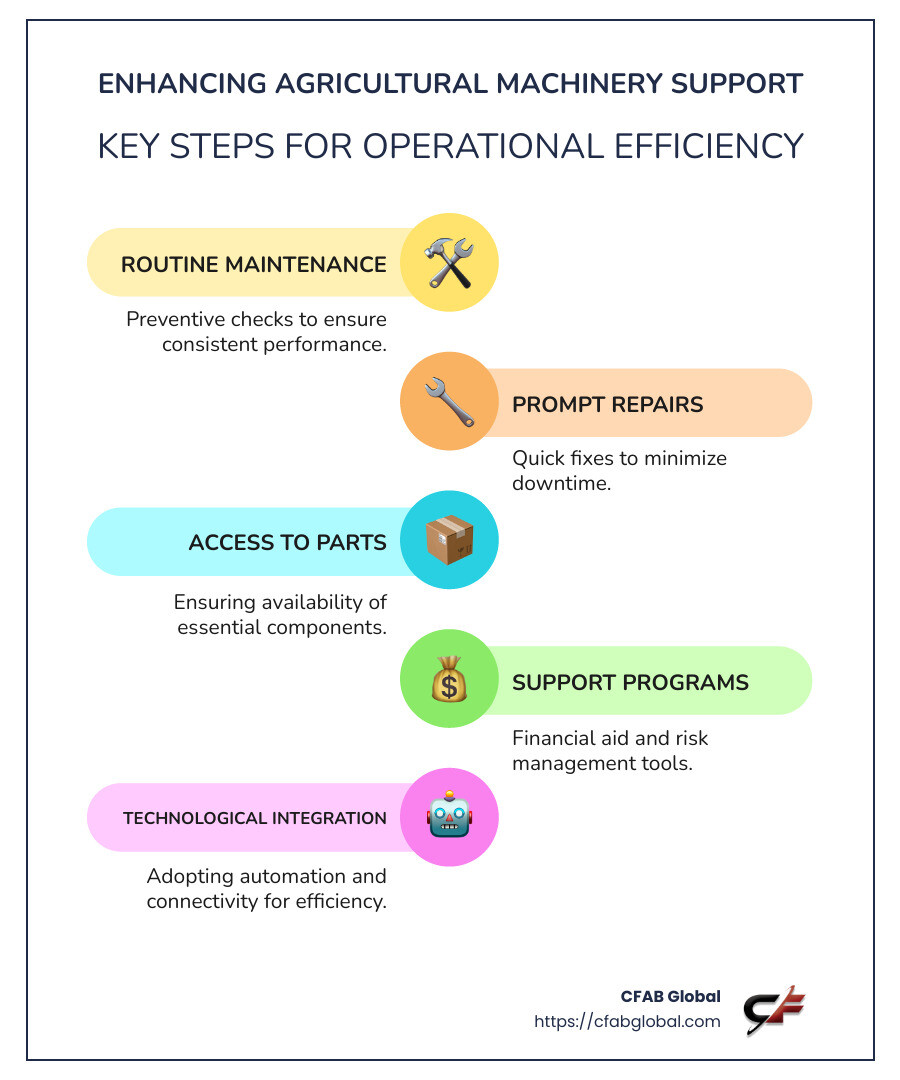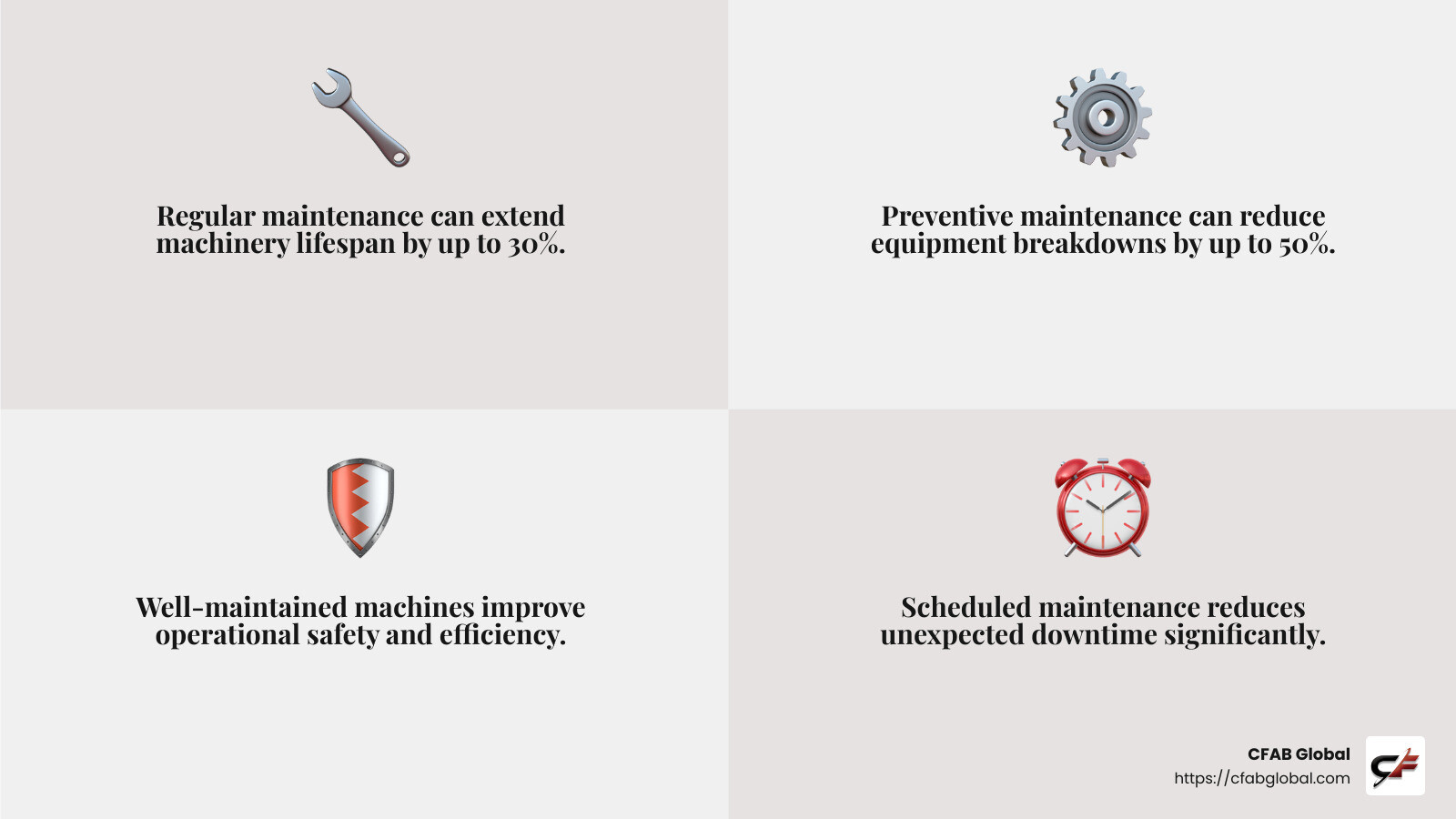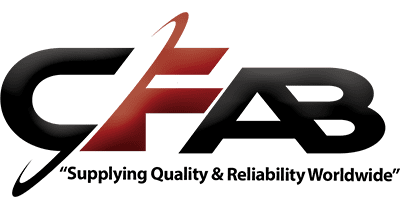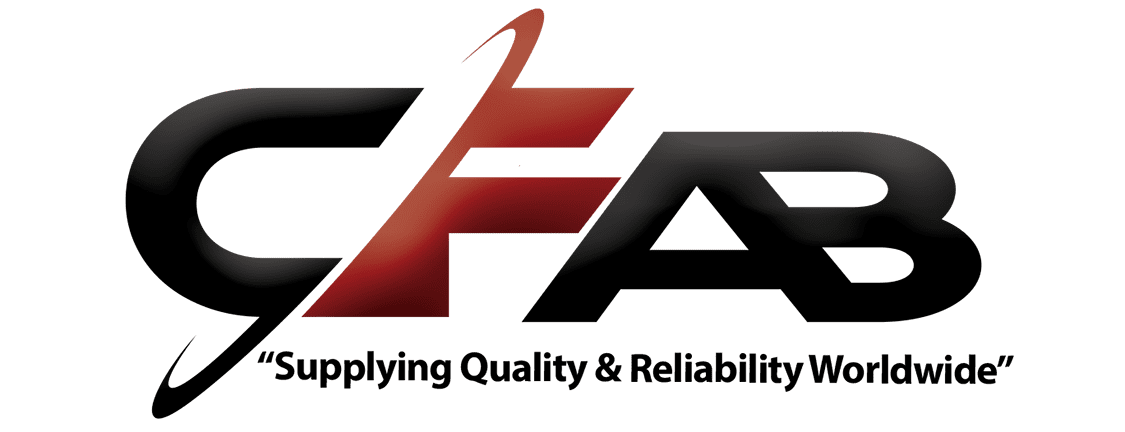Agricultural machinery support is vital for maximizing operational efficiency in the changing world of modern farming. Without effective support systems, farm equipment can suffer from frequent breakdowns, leading to lost productivity and increased maintenance costs. Efficient machinery is crucial for modern farms to thrive amid challenges like labor shortages and environmental pressures.
- Improves farm productivity: Mechanization boosts yields and profits.
- Addresses labor shortages: Reduces the need for manual labor.
- Ensures sustainability: Supports eco-friendly farming practices.
In my career as the CEO of CFAB Global, I’ve witnessed the transformative power of well-supported agricultural machinery. My experience includes designing lubrication systems that significantly cut maintenance issues, showcasing the profound impact of quality machinery support. This commitment to operational efficiency remains central to all CFAB Global solutions.

The Role of Agricultural Machinery Support
Importance of Maintenance
Maintenance is the backbone of a successful farm operation. It ensures that agricultural machinery is always ready when needed, reducing the risk of unexpected breakdowns.
Regular preventive maintenance is essential. It not only prevents costly repairs but also improves operational safety. For example, calibrated sensors and thermometers ensure that equipment operates within safe parameters, maintaining the quality of the end products.

A well-maintained machine is a reliable one. It keeps planting, fertilizing, and harvesting on schedule, which is crucial for maintaining productivity. The agricultural industry is expected to feed 9.7 billion people by 2050, making operational reliability more important than ever.
Repair Services
Even with the best maintenance, machines can occasionally fail. When they do, quick and effective repair services are critical to minimizing downtime.
Imagine a combine harvester breaking down in the middle of harvest season. Every hour it sits idle can mean lost crops and revenue. This is why having a reliable repair service is essential. Companies like TAM offer comprehensive repair solutions, from grain dryer inspections to winterizing equipment, ensuring that farms can get back to work quickly.
Parts availability is another key factor. With supply chain disruptions affecting the availability of machinery components, having a trusted partner who can source and supply parts swiftly is invaluable. This ensures that repairs are not delayed, keeping the farm’s operations smooth and uninterrupted.
In summary, agricultural machinery support through diligent maintenance and efficient repair services is crucial for reducing downtime and enhancing farm productivity. This support system underpins the reliability and efficiency of farm operations, ensuring that machinery is always ready to meet the demands of modern agriculture.
Types of Agricultural Machinery
Agricultural machinery plays a vital role in modern farming, helping farmers increase efficiency and productivity. Different types of machinery are designed for specific tasks, ensuring that every stage of the farming process is well-supported.
Machinery for Soil Cultivation
Soil cultivation is the first step in preparing land for planting. The right machinery makes this process efficient and effective.
-
Cultivators are used to mix and pulverize soil, creating a fine bed for seeds. They break up the soil surface, allowing for better water absorption and aeration.
-
Ploughs turn over the top layer of soil, bringing fresh nutrients to the surface. This is essential for healthy crop growth.
-
Strip-till machines offer a hybrid approach, combining the benefits of traditional tillage and no-till practices. They prepare narrow strips of soil for planting while leaving the rest of the field undisturbed, conserving moisture and reducing erosion.
Machinery for Planting and Harvesting
Once the soil is ready, planting and harvesting machinery take center stage.
-
Seed drills are essential for planting seeds at the right depth and spacing. They ensure even distribution, which is crucial for maximizing yield.
-
Combine harvesters are a farmer’s best friend during harvest season. These machines efficiently cut, thresh, and clean grain in one pass, saving time and labor.
In addition to these, tractors are the workhorses of any farm. They power other machinery, transport materials, and perform a variety of tasks around the farm. Their versatility makes them indispensable.
Irrigation systems also deserve a mention. They ensure that crops receive the right amount of water, which is crucial for growth. From simple sprinklers to advanced center-pivot systems, irrigation technology helps farmers manage water resources effectively.
In summary, the right machinery is crucial for successful soil cultivation, planting, and harvesting. Each piece of equipment is designed to perform specific tasks, improving efficiency and productivity on the farm. With the right support, farmers can ensure their machinery is always ready to tackle the challenges of modern agriculture.
Next, we’ll explore agricultural machinery support programs that provide financial assistance and risk management tools for farmers.
Agricultural Machinery Support Programs
As farming evolves, agricultural machinery support programs are crucial for helping farmers access the financial resources and risk management tools they need. These programs ensure that farmers can maintain and upgrade their equipment, ultimately boosting productivity and sustainability.
Accessing Capital
For small and mid-sized farmers, accessing capital is often a significant hurdle. The USDA offers several programs designed to ease this burden. One notable initiative is the Farm Storage Facility Loan (FSFL) Program. This program helps farmers finance essential equipment such as cold storage units and wash stations. These are vital for maintaining the quality of perishable produce like fruits and vegetables.
Another valuable resource is the USDA’s Microloan Program. This program simplifies the loan application process, allowing farmers to access up to $50,000. Since its inception in 2013, the program has provided over 8,400 microloans, with 70% of them going to beginning farmers. This support enables them to invest in necessary machinery and infrastructure, laying a solid foundation for their operations.
Risk Management Tools
Farming is inherently risky, with factors like weather and market prices often beyond a farmer’s control. To help mitigate these risks, the USDA offers various risk management tools. These include crop insurance options custom to the needs of small and mid-sized farmers. For instance, diversified producers can benefit from a whole farm insurance policy that reduces costs for beginning farmers.
In addition to insurance, financial planning resources are available. These tools help farmers make informed decisions about their operations, ensuring long-term viability. By utilizing these resources, farmers can better steer uncertainties and focus on growing their businesses.
Overall, these support programs from the USDA are essential for empowering farmers. By providing access to capital and risk management tools, they help farmers maintain their machinery, improve their operations, and secure a more stable future.
Next, we’ll dig into the technological advancements in agricultural machinery, exploring how automation and connectivity are changing the industry.
Technological Advancements in Agricultural Machinery
The agriculture industry is experiencing a technological revolution that is reshaping how farms operate. Key advancements in automation and connectivity are at the forefront of this change, enhancing efficiency and productivity across the board.
Automation and Connectivity
Automation in agriculture is not just about machines doing the work. It’s about creating a digital ecosystem where everything on the farm is connected and optimized. Imagine tractors that can drive themselves, guided by GPS and data analytics to plant seeds with pinpoint accuracy. This isn’t science fiction—it’s happening now.
Data analytics plays a vital role in this ecosystem. By collecting and analyzing data from connected sensors and equipment, farmers can make smarter decisions. For example, sensors can monitor soil moisture levels and adjust irrigation systems automatically, ensuring crops get just the right amount of water. This not only saves resources but also boosts yields.
Connectivity is the backbone of these advancements. With a solid infrastructure in place, farms can use advanced technologies to their full potential. According to a McKinsey report, successful connectivity in agriculture could add $500 billion to the global GDP by 2030. This potential highlights the importance of investing in robust connectivity solutions.
Enhancing Efficiency
These technological advancements are all about enhancing efficiency. By automating repetitive tasks and optimizing resource use, farms can significantly reduce waste and increase productivity. For instance, automated machinery can work longer hours without fatigue, increasing the amount of work done in a day.
Resource management is another critical area where technology shines. With tools like farm automation systems, farmers can track and manage inputs like water, fertilizers, and pesticides more precisely. This not only cuts costs but also supports environmental sustainability by reducing the overuse of chemicals.
These technologies provide a productivity boost that helps farmers meet the growing demand for food. As the global population continues to rise, efficient and sustainable farming practices become even more crucial.
In the next section, we’ll address frequently asked questions about agricultural machinery support, helping you understand what machinery is considered essential and how maintenance impacts farm productivity.
Frequently Asked Questions about Agricultural Machinery Support
What is considered agricultural machinery?
Agricultural machinery encompasses a wide range of equipment used to improve farm productivity. This includes tractors, which are the backbone of modern farming, providing the power needed for various tasks. Harvesters, such as combine harvesters, play a crucial role in efficiently gathering crops like wheat and corn. Additionally, irrigation systems ensure that crops receive adequate water, optimizing growth and yield.
Other essential equipment includes cultivators for soil preparation, seed drills for precise planting, and ploughs for turning the soil. Each machine is designed for specific tasks, helping farmers work more efficiently and effectively.
How does maintenance impact farm productivity?
Maintenance is a critical aspect of keeping agricultural machinery running smoothly and efficiently. Preventive maintenance helps avoid unexpected breakdowns, which can lead to costly downtime during crucial farming seasons. Regular checks and servicing ensure that equipment operates safely and at peak performance.
For instance, a well-maintained tractor won’t just last longer; it will also use less fuel and be more reliable. According to a Midwest Machinery service plan, proper maintenance can significantly reduce downtime, allowing farmers to focus on their operations rather than repairs. This leads to increased productivity and, ultimately, higher farm income.
What support programs are available for small farmers?
Small and mid-sized farmers have access to various support programs designed to ease financial burdens and improve farm operations. The USDA offers microloans that provide up to $50,000 with a simplified application process, enabling farmers to invest in necessary equipment and infrastructure.
Another valuable resource is the Farm Storage Facility Loan (FSFL) Program, which assists farmers in financing storage facilities like grain bins and cold storage. This program has been updated to waive certain requirements, making it more accessible to diversified and smaller producers.
Moreover, the USDA’s Risk Management Agency is developing tools to help farmers make informed financial decisions. This includes crop insurance options custom to the needs of diverse producers, helping them manage risks and plan for the future.
These programs and tools are vital for supporting small farmers, ensuring they have the resources and knowledge to thrive in an changing agricultural landscape.
Conclusion
At CFAB Global, we understand that every farm is unique. That’s why our Machine Reliability Program is designed to offer custom solutions that cater to the specific needs of each client. Our program is not just about fixing what’s broken; it’s about enhancing the performance, reliability, and lifespan of your agricultural machinery.
Why choose CFAB Global?
-
Expertise: Our team of specialists brings years of industry experience to the table, ensuring that you receive the highest level of support.
-
Customized Solutions: We tailor our Machine Reliability Program to address your specific machinery needs and challenges. This personalized approach means you get strategies and services that truly fit your operations.
-
Proactive Maintenance: We focus on predictive maintenance strategies that help prevent breakdowns before they occur. This means less downtime and more time for you to focus on what matters—your farm.
-
Increased ROI: By reducing downtime and extending the lifespan of your machinery, CFAB Global helps your business maximize its return on investment.
Our commitment to providing top-tier services and equipment doesn’t stop at implementation. We offer ongoing support to ensure your machinery continues to operate at peak performance. Whether you’re in agriculture, manufacturing, construction, or energy, our solutions are designed to improve your operational efficiency.
Partner with CFAB Global and experience the benefits of a custom approach to agricultural machinery support. With us, you’re not just maintaining your equipment—you’re investing in the future of your farm.






